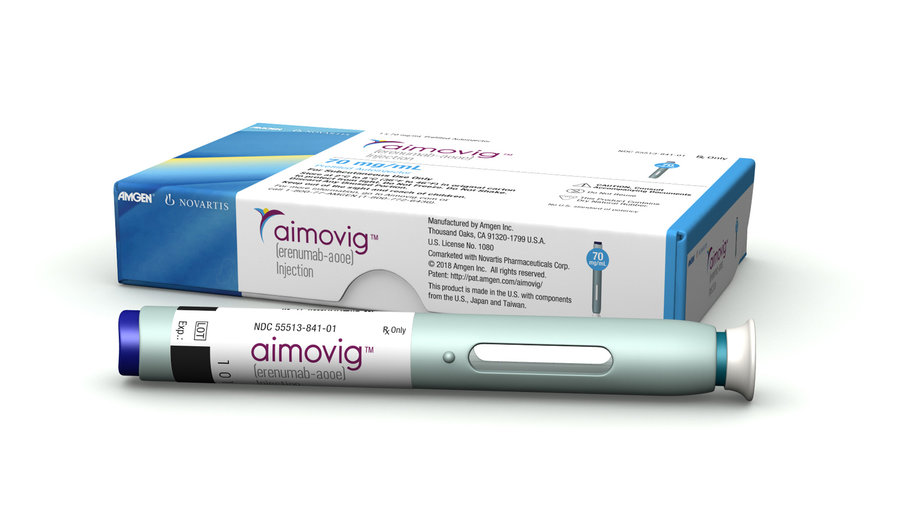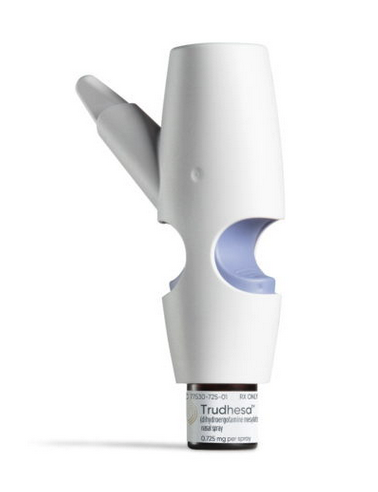Aimovig (erenumab) vs Trudhesa (dihydroergotamine mesylate)
Aimovig (erenumab) vs Trudhesa (dihydroergotamine mesylate)
Aimovig (erenumab) is a once-monthly injectable monoclonal antibody that targets the calcitonin gene-related peptide (CGRP) receptor, which is implicated in migraine pathophysiology, and is used as a preventive treatment for migraines. Trudhesa (dihydroergotamine mesylate), on the other hand, is a nasal spray used for the acute treatment of migraine with or without aura, and it works by constricting blood vessels and inhibiting inflammatory substances in the brain. When deciding between the two, it is important to consider whether the goal is to prevent migraines from occurring (Aimovig) or to treat migraines once they have started (Trudhesa), as well as to discuss with a healthcare provider any personal health factors that might influence the choice of medication.
Difference between Aimovig and Trudhesa
| Metric | Aimovig (erenumab) | Trudhesa (dihydroergotamine mesylate) |
|---|---|---|
| Generic name | Erenumab | Dihydroergotamine mesylate |
| Indications | Preventive treatment of migraine in adults | Acute treatment of migraine with or without aura in adults |
| Mechanism of action | Calcitonin gene-related peptide (CGRP) receptor antagonist | Agonist at serotonin (5-HT) receptors; causes vasoconstriction |
| Brand names | Aimovig | Trudhesa, Migranal |
| Administrative route | Subcutaneous injection | Nasal spray |
| Side effects | Injection site reactions, constipation, cramps, muscle spasms | Nausea, vomiting, nasal discomfort, throat irritation |
| Contraindications | Hypersensitivity to erenumab or any of its excipients | Hypersensitivity to dihydroergotamine or any of its excipients, uncontrolled hypertension, pregnancy |
| Drug class | Monoclonal antibody | Ergot alkaloid |
| Manufacturer | Amgen | Impel NeuroPharma |
Efficacy
Efficacy of Aimovig (Erenumab) for Migraine
Aimovig (erenumab) is a novel therapeutic agent specifically designed for the prevention of migraine. It is a human monoclonal antibody that targets the calcitonin gene-related peptide (CGRP) receptor, which is implicated in migraine pathophysiology. Clinical trials have demonstrated the efficacy of Aimovig in reducing the number of monthly migraine days. In these studies, patients treated with Aimovig experienced a significant reduction in migraine frequency compared to those on placebo. The treatment is generally well-tolerated, with a safety profile similar to placebo, and the most common side effects include injection site reactions and constipation.
The efficacy of Aimovig has been observed across a spectrum of migraine patients, including those with chronic migraine (defined as 15 or more headache days per month) and episodic migraine (fewer than 15 headache days per month). In clinical trials, patients with chronic migraine receiving Aimovig saw a reduction of 2.5 to 3 fewer migraine days per month compared to placebo, while those with episodic migraine experienced approximately 1 to 2.5 fewer migraine days per month.
Efficacy of Trudhesa (Dihydroergotamine Mesylate) for Migraine
Trudhesa (dihydroergotamine mesylate), on the other hand, is a medication with a long history of use in the acute treatment of migraine headaches. Unlike Aimovig, Trudhesa is not used for prevention but rather for the relief of migraine symptoms once they have started. It is a member of the ergot family of medications and works by constricting blood vessels around the brain and affecting the flow of certain natural substances in the brain.
The efficacy of Trudhesa has been well-established through its use over many years. It has been shown to be effective in reducing the severity of migraine headaches and associated symptoms such as nausea and sensitivity to light and sound. Trudhesa is particularly noted for its benefit in patients who do not respond to triptans, another class of migraine medications. It is administered using a nasal spray, which can be advantageous for patients who experience nausea and vomiting with their migraines and may not tolerate oral medications well.
Regulatory Agency Approvals
Aimovig
-
European Medical Agency (EMA), European Union

-
Food and Drug Administration (FDA), USA

-
Health Canada

-
Pharmaceuticals and Medical Devices Agency (PMDA), Japan

-
Therapeutic Goods Administration (TGA), Australia

-
Swissmedic (CH)

-
Medsafe (NZ)

Trudhesa
-
Food and Drug Administration (FDA), USA

Access Aimovig or Trudhesa today
If Aimovig or Trudhesa are not approved or available in your country (e.g. due to supply issues), you can access them via Everyone.org.
How it works

Make an enquiry
Choose the medicine you want to buy, answer a couple of questions, and upload your prescription to speed things up. We’ll get back to you within 24 hours.


Make an enquiry
Choose the medicine you want to buy, answer a couple of questions, and upload your prescription to speed things up. We’ll get back to you within 24 hours.


Breeze through the paperwork
We'll guide you through the required documents for importing unapproved medicine, ensuring you have all the necessary information.


Get a personalized quote
We’ll prepare a quote for you, including medicine costs and any shipping, administrative, or import fees that may apply.


Receive your medicine
Accept the quote and we’ll handle the rest - sourcing and safely delivering your medicine.

Some text on this page has been automatically generated. Speak to your physician before you start a new treatment or medication.
Let's talk
If you have any questions, call us or send us a message through WhatsApp or email:
Contact us




